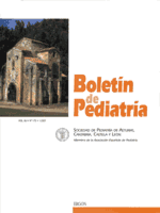Tos ferina, una enfermedad potencialmente grave en el lactante. ¿Por qué no adelantamos su prevención?
B. Panizo Santos , M.J. López Mendía , V. Madrigal Diez , M.J. Lozano de la Torre
Bol. Pediatr. 2001; 41 (175): 30 - 32
La tos ferina es una infección respiratoria aguda ocasionada por la Bordetella pertussis, produciendo en lactantes menores de 6 meses una enfermedad grave con manifestaciones atípicas. Presentamos 13 lactantes con tos ferina ingresados durante el periodo de un año en nuestro hospital. La mayoría de ellos, a pesar de su edad media (2 meses y 5 días), presentaron la característica tos paroxística en salvas. Analíticamente además de leucocitosis con linfocitosis, se observó trombocitosis. El diagnóstico fue confirmado bacteriológicamente en un alto porcentaje de los casos. El promedio de estancia en el hospital fue de 12 días y dos ellos precisaron ingreso en la Unidad de Cuidados Intensivos. Todos recibieron tratamiento durante 14 días con eritromicina, siendo la evolución favorable. Ocho de nuestros pacientes eran menores de dos meses por lo que no habían sido vacunados. Proponemos iniciar la vacunación de tos ferina a las 4 semanas de vida así como administrar dosis de recuerdo a los 6 años, 11-13 años y en la edad adulta. Recordamos que es recomendable administrar eritromicina no sólo a los casos, sino también a sus familiares íntimos. Abstract Whooping cough is an acute respiratory infection caused by the Bordetella pertussis, which produces a serious disease with atypical manifestations in infants under 6 months. We present the cases of 13 infants with whooping cough admitted to hospital during a one year period in our hospital. In spite of their mean age (2 months and 5 days), most of them presented the characteristic paroxysmal cough in salvia. In addition to leukocytosis with lymphocytosis, thrombocytosis was also observed in the analysis. The biological study confirmed the diagnosis in a high percentage of the cases. The average stay in hospital was 12 days and two of them were sent to the Intensive Care Unit. All received treatment for 14 days with erythromycin, with a favorable course. Eight of our patients were under two months, so that they had not been vaccinated. We propose that the whooping cough vaccination should be initiated at 4 weeks of life and that a booster shot should be administered at 6 years, 11-13 year and in the adult age. We emphasize that the administration of erythromycin is not only recommendable for the cases in question but also for the close family members.
\N
\N
Artículo completo (PDF) (15 kb.)
- Infectología
